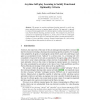234 search results - page 19 / 47 » A polynomial-time nash equilibrium algorithm for repeated ga... |
116
click to vote
TCS
2010
14 years 6 months ago
2010
We consider network congestion problems between TCP flows and define a new game, the Window-game, which models the problems of network congestion caused by the competing flows. An...
CSJM
2006
14 years 11 months ago
2006
The Nash equilibria set (NES) is described as an intersection of graphs of best response mappings. The problem of NES computing for multi-matrix extended games is considered. A me...
126
click to vote
UAI
2000
15 years 29 days ago
2000
Stochastic games generalize Markov decision processes MDPs to a multiagent setting by allowing the state transitions to depend jointly on all player actions, and having rewards de...
106
click to vote
ALDT
2009
Springer
15 years 6 months ago
2009
Springer
We present an anytime multiagent learning approach to satisfy any given optimality criterion in repeated game self-play. Our approach is opposed to classical learning approaches fo...
115
click to vote
SAGT
2010
Springer
14 years 10 months ago
2010
Springer
The PPAD-completeness of Nash equilibrium computation is taken as evidence that the problem is computationally hard in the worst case. This evidence is necessarily rather weak, in ...

